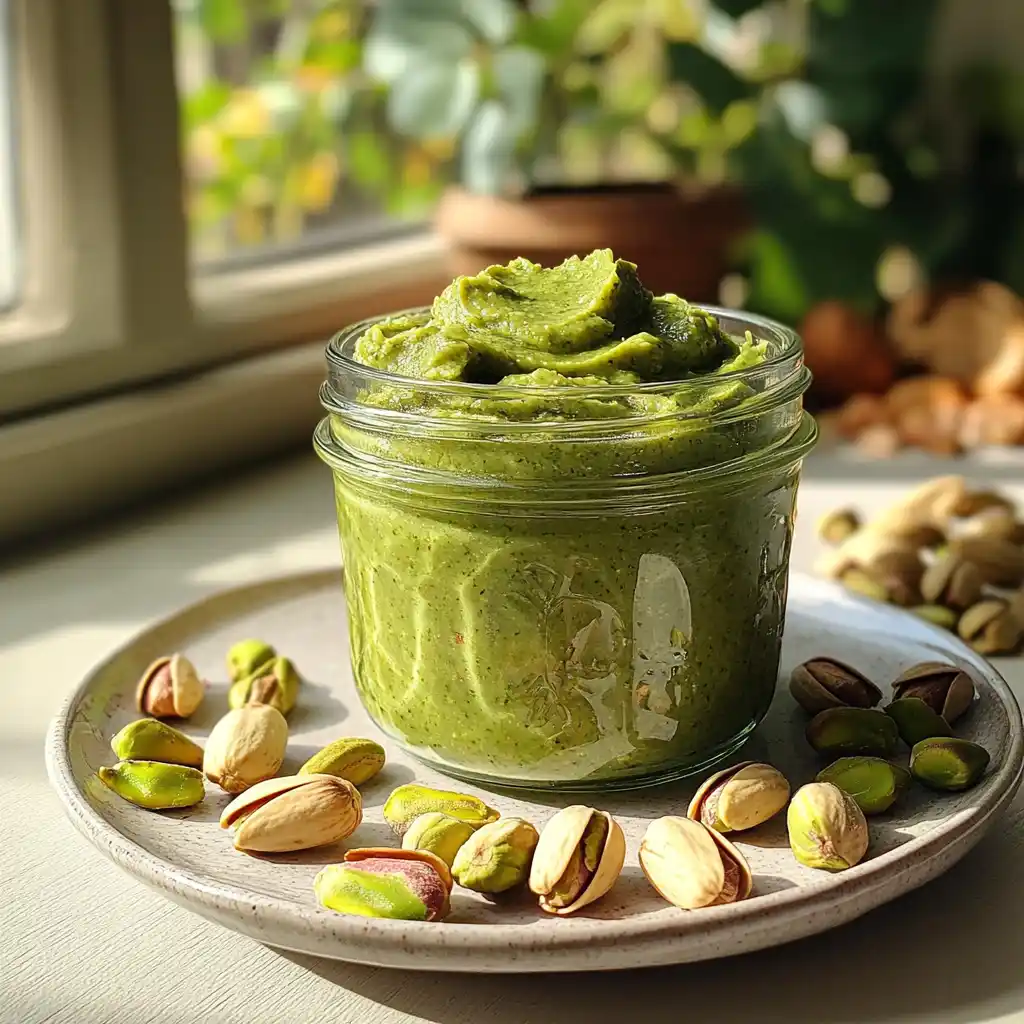Pistachio butter is more than a creamy spread — it’s a wholesome, flavorful choice packed with nutrients and rich flavor. In this article, we’ll explore its health benefits, how it compares to other nut butters, why it’s considered a premium product, and the many ways you can enjoy it.
My love for cooking began in a small coastal kitchen, where I learned from women who believed food was about more than feeding people — it was about connection. One of my earliest memories is helping my aunt make her famous olive bread, standing on a stool and sprinkling herbs like magic dust.
That spark turned into a lifelong passion for food with meaning. Now, every recipe I create is inspired by moments like those. Pistachio butter is one of those ingredients that reminds me why I cook — simple, comforting, and full of flavor.
Don’t miss our healthy smoothie recipes to enjoy with pistachio butter.
Table of Contents
What Is Pistachio Butter?
What Is It and How Is It Different?
This creamy green spread is made by grinding roasted pistachios into a smooth, rich paste. Compared to peanut or almond options, it offers a naturally sweet flavor and buttery texture, all without added sugars or artificial oils.
While some versions are sweetened or salted, the purest kind contains only pistachios — and maybe a hint of sea salt. Its striking green hue comes from chlorophyll and antioxidants in the nuts.
How It’s Made: Homemade vs. Store-Bought Versions
Homemade version:
Making it at home means controlling every ingredient. Roasted pistachios are blended until they release their natural oils and turn into a creamy consistency. The result is a thick, earthy nut spread without additives.
Commercial version:
Some brands enhance their spreads with sugar, milk powder, or oils, especially those labeled as dessert-style pistachio spreads. These tend to have a smoother consistency and sweeter flavor, ideal for toppings or baking.
| Feature | Homemade Version | Store-Bought Option |
|---|---|---|
| Ingredients | Just pistachios and sea salt | May include sugar, oils, stabilizers |
| Texture | Slightly coarse, natural feel | Whipped, smooth, dessert-like |
| Shelf Life | Shorter (needs refrigeration) | Longer with preservatives |
| Flavor | Nutty, bold, less sweet | Mild and sweet |
| Price Point | Lower when DIY | Higher due to branding and processing |
Check out our berry smoothie recipe that pairs perfectly with any nut-based spread.
Print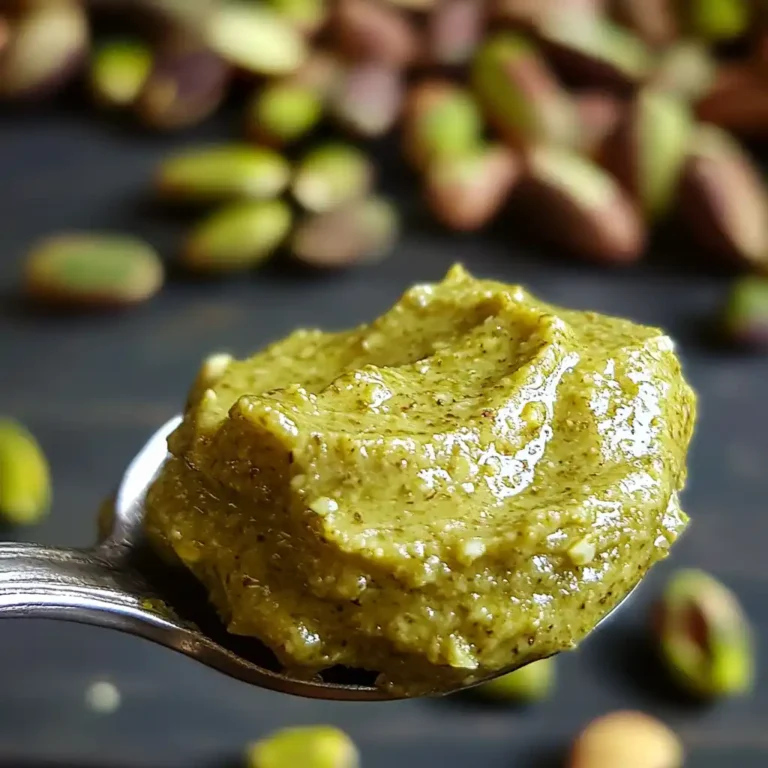
Pistachio Butter – Benefits, Uses, Cost, and Comparison Guide
Creamy, naturally sweet, and full of nutrients, this homemade pistachio butter is easy to make and packed with flavor. Use it in sweet or savory recipes, or simply enjoy it by the spoonful.
- Total Time: 17 minutes
- Yield: 1 cup
Ingredients
- 2 cups shelled, unsalted pistachios
- ½ tsp sea salt (optional)
- 1 tbsp neutral oil (optional, for smoother texture)
Instructions
- Preheat oven to 350°F (175°C). Spread pistachios on a baking sheet and roast for 5–7 minutes to bring out their oils and enhance flavor. Let cool slightly.
- Add roasted pistachios to a high-speed blender or food processor.
- Blend in intervals, scraping down sides as needed. The nuts will first turn into powder, then clump, and eventually transform into creamy butter (about 5–10 minutes).
- For a smoother result, add sea salt and oil, then blend again until fully incorporated.
- Transfer to a glass jar and store in the fridge for up to 3 weeks.
Notes
For ultra-smooth pistachio butter, soak nuts in warm water for 15 minutes, then rub with a towel to remove skins before blending. Always use airtight storage to maintain freshness.
- Prep Time: 10 minutes
- Cook Time: 7 minutes
- Category: Spread
- Method: Blended
- Cuisine: Mediterranean
- Diet: Vegan
Health Benefits of Pistachio Butter
Nutritional Profile: Packed With Vitamins, Minerals, and Good Fats
Pistachio butter is more than just a delicious treat — it’s a powerhouse of essential nutrients that support your well-being. In every spoonful, this green-hued spread delivers a unique blend of plant-based protein, healthy fats, and vital micronutrients.
Here’s what makes pistachio butter such a standout in the world of nut butters:
- Vitamin B6 helps with brain development and hormone regulation
- Magnesium promotes bone health and improves sleep quality
- Potassium regulates blood pressure and supports muscle recovery
- Monounsaturated fats boost heart health by reducing bad cholesterol
- Antioxidants help fight oxidative stress and reduce inflammation
| Nutrient | Amount per 2 Tbsp | Health Benefit |
|---|---|---|
| Calories | 180–200 | Natural energy |
| Protein | 6g | Muscle support |
| Total Fat | 16g (mostly healthy) | Heart protection |
| Fiber | 3g | Supports digestion |
| Vitamin B6 | ~25% DV | Brain and immune health |
| Potassium | ~290mg | Regulates blood pressure |
If you’re looking for a nutrient-dense alternative to peanut butter, pistachio butter offers a better blend of micronutrients without compromising flavor.
Why Pistachio Butter Supports the Heart, Skin, and Brain
The heart-friendly fats found in pistachio butter — especially oleic acid — help lower LDL (bad cholesterol) while boosting HDL (good cholesterol). That’s a major win for cardiovascular health.
It’s also a beauty booster. Thanks to vitamin E and carotenoids, pistachio butter promotes glowing skin and fights signs of aging. Meanwhile, its rich supply of B vitamins and magnesium supports brain clarity, nervous system function, and mood regulation.
Unlike processed spreads, pistachio butter delivers benefits without the junk — making it a great fit for clean eating, Mediterranean, or plant-based diets.
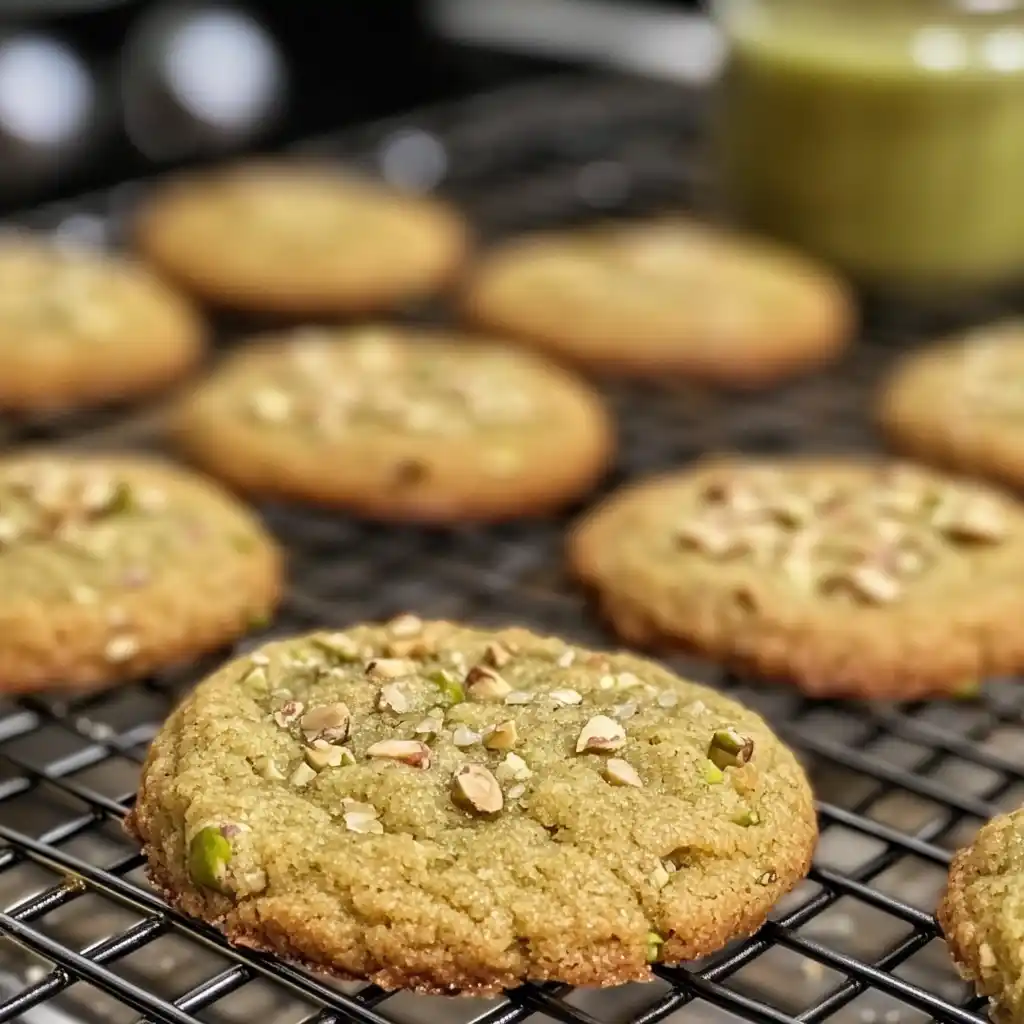
Want even more superfoods in your diet? Check out our green detox smoothie to pair with nut butters like this one.
What Is Pistachio Butter Good For?
Everyday Uses: From Breakfast to Dessert
Pistachio butter is one of those rare ingredients that works equally well in both savory and sweet recipes. Its creamy texture and rich, nutty flavor make it incredibly versatile in the kitchen. You can enjoy it:
- As a spread on toast, bagels, rice cakes, or pancakes
- Blended into smoothies for added protein and creaminess
- Swirled into oatmeal or yogurt for extra flavor
- Used as a dip for fruit, crackers, or pretzels
- Baked into desserts like cookies, cakes, or energy bites
This smooth green spread also shines as a frosting base or a drizzle over ice cream. If you’re looking for something indulgent but nutrient-dense, pistachio butter fits the bill.
Fitness, Nutrition, and Diet-Friendly Benefits
For those focused on clean eating, pistachio butter is a natural, plant-based option that supports a variety of diet goals. It’s especially popular in:
- High-protein diets, offering muscle support and sustained energy
- Low-carb or keto diets, thanks to its high fat-to-carb ratio
- Vegetarian and vegan diets, as a protein-rich meat alternative
- Anti-inflammatory eating plans, due to its antioxidant content
Plus, it’s dairy-free and gluten-free, which makes it safe for most people with food sensitivities. Athletes and active individuals often add pistachio butter to their post-workout shakes or energy bars for recovery and performance support.
Here’s a quick breakdown of how pistachio butter supports dietary goals:
| Diet Type | Benefit of Pistachio Butter |
|---|---|
| High-Protein | Muscle fuel, satiety, and energy |
| Keto/Low-Carb | Healthy fats, low sugar, low carbs |
| Plant-Based/Vegan | Meat-free protein, nutrient-dense |
| Gluten-Free | Naturally gluten-free and safe |
Don’t miss our easy natural Mounjaro tea recipe — a soothing sip to pair with a pistachio butter snack.
Pistachio Butter vs Other Nut Butters
Pistachio Butter vs. Peanut Butter: Which Is Healthier?
When comparing pistachio butter to peanut butter, the differences are subtle but meaningful — especially if you’re looking for a cleaner, more nutrient-dense option.
Here’s how they stack up nutritionally:
| Nutrient | Pistachio Butter (2 tbsp) | Peanut Butter (2 tbsp) |
|---|---|---|
| Calories | ~190 | ~190 |
| Protein | 6g | 8g |
| Total Fat | 16g (healthy fats) | 16g (may include saturated) |
| Carbohydrates | 6g | 7g |
| Fiber | 3g | 2g |
| Vitamin B6 | High | Moderate |
| Antioxidants | High | Lower |
While peanut butter is slightly higher in protein, pistachio butter wins in micronutrients. It’s richer in antioxidants, fiber, and vitamin B6. Plus, it typically has fewer additives, especially when homemade or sourced from clean-label brands.
The biggest edge pistachio butter has? It’s lower on the allergen scale and is often tolerated by people with peanut sensitivities.
Discover great ideas like our coconut oatmeal chocolate chip cookies, which pair beautifully with alternative nut butters.
Comparison with Almond, Cashew, and Hazelnut Butters
Pistachio butter also holds its own against premium nut spreads like almond or cashew butter. It offers a distinct flavor that’s more earthy and subtly sweet, with a texture that can range from dense to whipped depending on preparation.
Let’s break it down:
| Butter Type | Flavor Profile | Best Use | Nutrition Highlight |
|---|---|---|---|
| Pistachio | Nutty, earthy, sweet | Versatile – savory & sweet | High in antioxidants & B6 |
| Almond | Mild, slightly sweet | Smoothies, sauces | High in vitamin E |
| Cashew | Buttery, soft flavor | Baking, creamy sauces | Creamiest texture |
| Hazelnut | Rich, bold, dessert-like | Sweet spreads, frostings | Pairs well with chocolate |
Many dessert spreads use hazelnuts, like Nutella, but pistachio butter offers a cleaner, more nutrient-forward option with less sugar and more fiber.
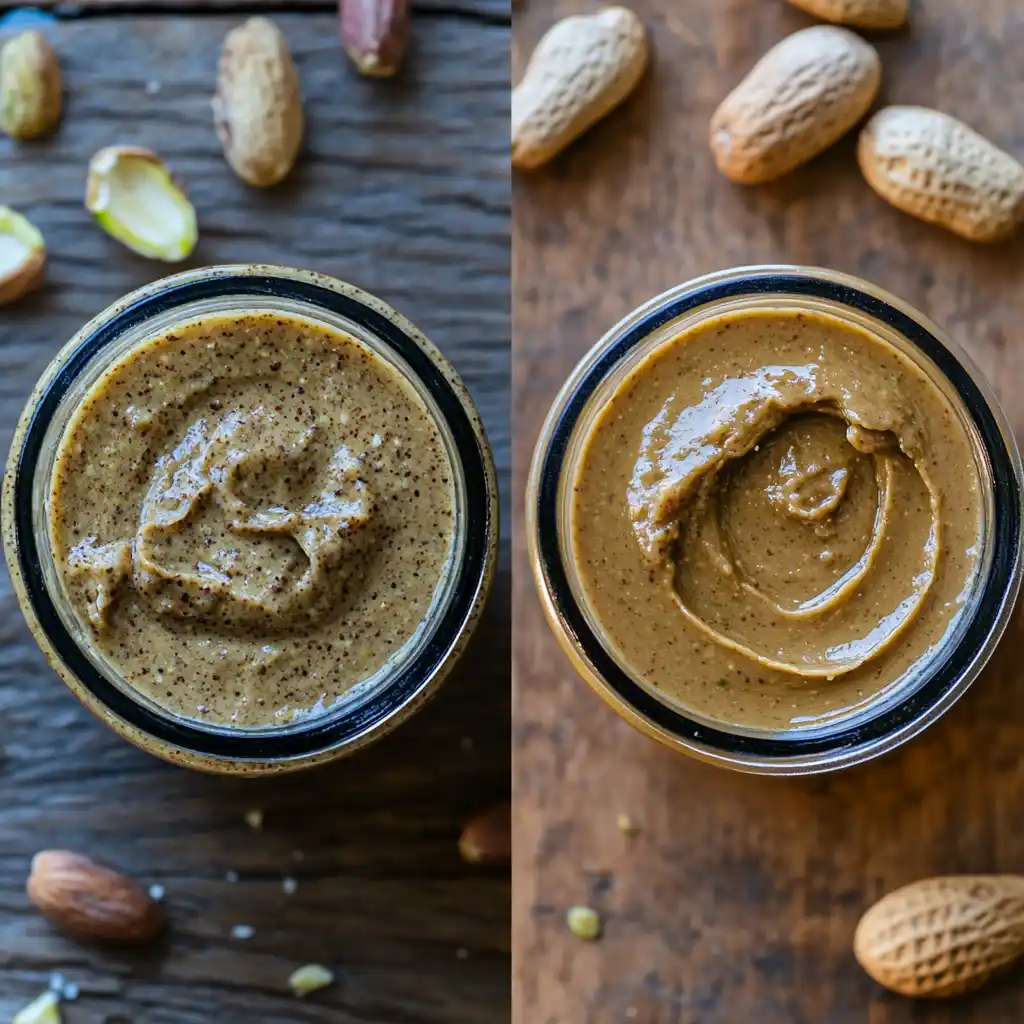
If you’re tired of the same jar of almond or peanut butter, switching to pistachio butter can refresh your meals while offering stronger health benefits.
Why Is Pistachio Butter So Expensive?
Pistachio Farming: Labor, Climate, and Harvesting Costs
One of the first things people notice about pistachio butter is the price tag. Compared to peanut or almond spreads, it can cost two to three times more. But that cost isn’t arbitrary — it starts at the root of the process: farming.
Pistachios require:
- A hot, dry climate and long growing season
- Up to seven years to produce their first full harvest
- Hand labor for picking and sorting
- Strict irrigation and pest management techniques
Because of these factors, pistachios are labor-intensive and climate-dependent, making them more expensive to produce. The limited number of regions that can successfully grow pistachios — like California, parts of the Mediterranean, and the Middle East — adds to the cost pressure.
That high base price of raw pistachios drives up the cost of anything made from them — especially something as concentrated as pistachio butter.
Processing, Supply, and Niche Demand
Beyond the farming costs, producing pistachio butter involves additional steps that other nut butters don’t always require. For example:
- Pistachios must be shelled, skinned, and sometimes roasted before blending
- Smaller batch production and specialty equipment increase operating costs
- Low-volume processing means higher per-unit expense
Additionally, pistachio butter isn’t as widely produced as peanut or almond butter. That makes it more of a niche market product — with fewer brands, less automation, and limited supply chains. When something is in demand but hard to find, the price naturally climbs.
| Cost Factor | Impact on Price |
|---|---|
| Long cultivation time | Higher farming investment |
| Manual labor requirements | More expensive production |
| Small-scale processing | Low volume = high cost |
| Premium packaging & branding | Boutique market pricing |
Despite the price, pistachio butter is valued for its nutrition, flavor, and uniqueness. Many consumers are willing to pay more for a product that’s clean, flavorful, and not mass-produced.
Don’t miss our guide on gluten-free desserts to see how you can incorporate premium ingredients into simple recipes.
Pistachio Butter Taste & Texture
Flavor Profile: Sweet, Earthy, and Buttery
The first thing you’ll notice about pistachio butter is its distinct, complex flavor. It’s not overly sweet like hazelnut spreads, and it doesn’t have the bitterness that can sometimes come with almond butter. Instead, it delivers a naturally nutty, slightly sweet, and earthy taste — all wrapped in a creamy, luxurious texture.
When made with nothing but roasted pistachios and a pinch of salt, this green spread offers a bold, clean pistachio flavor. The subtle sweetness isn’t from added sugar — it comes from the nut itself. That makes pistachio butter a favorite among food lovers who appreciate real, whole ingredients.
Does Pistachio Spread Taste Like Nutella?
This is a common question — especially for those seeing a green spread for the first time and expecting something chocolatey. Let’s clear it up:
- Pistachio butter is NOT the same as Nutella
- Nutella is primarily made from sugar, palm oil, and hazelnuts
- Pistachio butter is made mostly from roasted pistachios
That said, there are pistachio spreads designed to mimic the dessert-like quality of Nutella. These may include white chocolate, sugar, or milk powder — and can taste quite sweet and creamy. If you’re craving a treat, those options are great. But if you want a healthier, more natural choice, stick to 100% pistachio butter or a version with minimal ingredients.
| Spread Type | Key Ingredients | Taste Profile |
|---|---|---|
| Pistachio Butter | Roasted pistachios, salt (optional) | Nutty, slightly sweet |
| Pistachio Dessert Spread | Pistachios, sugar, milk, oils | Creamy, sweet, indulgent |
| Nutella (Hazelnut Spread) | Sugar, palm oil, hazelnuts, cocoa | Sweet, chocolatey, rich |
The texture of pistachio butter varies by brand and method. Homemade versions tend to be thick and rustic, while commercial ones are ultra-smooth — especially dessert spreads.
Check out our ricotta cheesecake recipe — a fantastic dessert to complement pistachio or nutty flavors.
How to Use Pistachio Butter in Recipes
Sweet Creations: Cookies, Cakes, and Frostings
Pistachio butter adds a rich, nutty twist to desserts that’s hard to beat. Its naturally sweet and creamy profile makes it a perfect base for baked goods and treats. Whether you’re creating simple cookies or elaborate frostings, this versatile spread offers depth and flavor.
Here are some favorite ways to use pistachio butter in sweet recipes:
- Pistachio butter cookies – Use it in place of peanut butter for a gourmet spin
- No-bake energy bites – Mix with oats, honey, and seeds for a healthy snack
- Frostings and fillings – Whip it with cream cheese or coconut cream for cakes
- Brownies and blondies – Swirl it into batter for a marbled look and extra richness
- Drizzle over fruit or pancakes – Especially great with bananas, strawberries, or figs
For those who enjoy natural sweetness without added sugars, pistachio butter delivers rich flavor while keeping desserts clean and satisfying.
Looking for inspiration? Try our lemon cream cake recipe — the tart citrus pairs beautifully with pistachio tones.
Savory Dishes: Pasta Sauces, Dressings, and Marinades
Though often seen in sweet dishes, pistachio butter shines in savory cooking too. Its earthy flavor works wonderfully in Mediterranean and Middle Eastern-inspired meals.
Try these savory applications:
- Creamy pasta sauce – Blend with garlic, lemon, and olive oil for a pistachio pesto alternative
- Salad dressing – Whisk into vinaigrettes for a rich, nutty twist
- Glazes for roasted veggies – Combine with miso or balsamic for depth
- Stuffings or fillings – Use in stuffed mushrooms or inside savory pastries
- Marinade base – Mix with lemon, herbs, and spices for meat or tofu
Because pistachio butter has a more refined taste than peanut or cashew spreads, it adapts to complex dishes without overpowering other ingredients.
Here’s a quick flavor pairings chart:
| Dish Type | Ingredients That Pair Well |
|---|---|
| Pasta | Garlic, lemon, basil, Parmesan |
| Salads | Apple cider vinegar, honey, mustard |
| Veggies | Balsamic, chili flakes, rosemary |
| Meats/Tofu | Lemon juice, cumin, oregano |
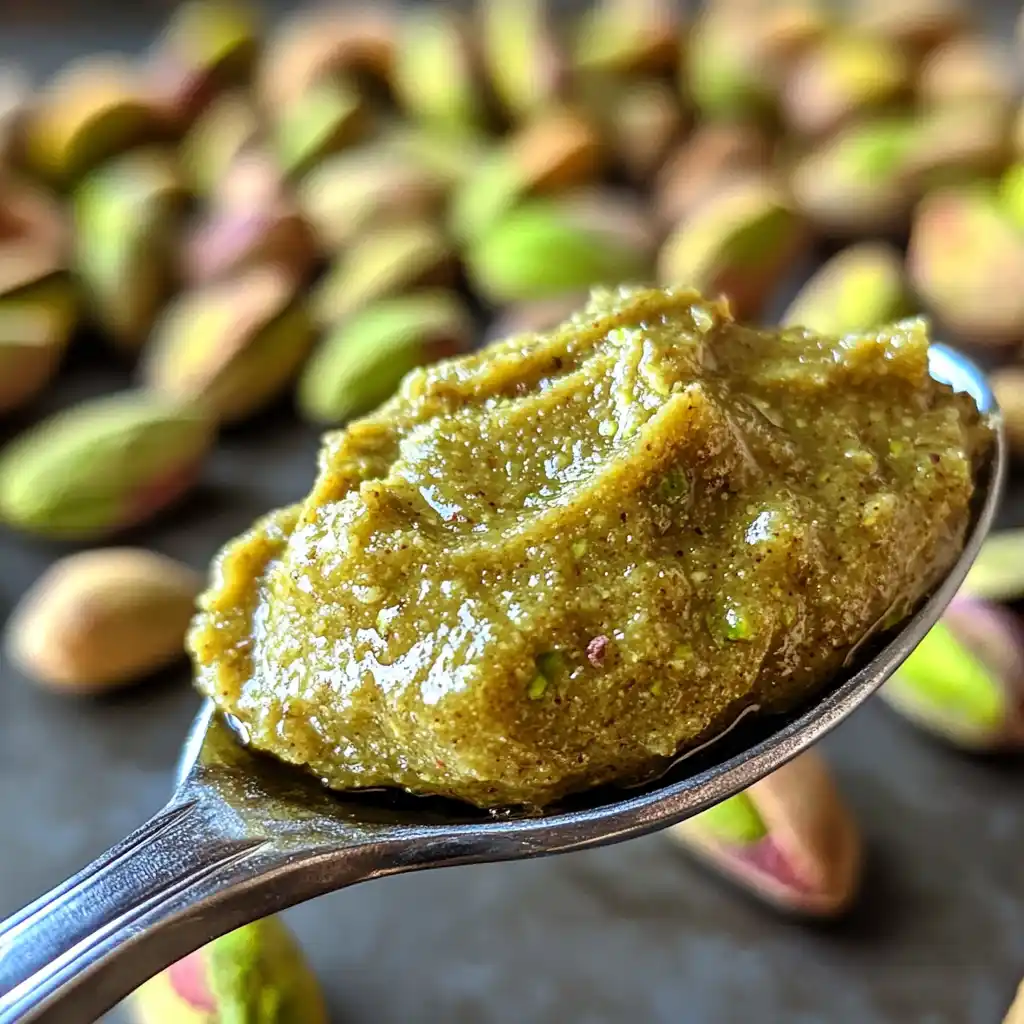
Learn more about low-calorie matcha drinks to enjoy alongside your pistachio-infused meals.
Homemade Pistachio Butter Recipe
Step-by-Step: How to Make Pistachio Butter at Home
Making pistachio butter at home is simple, satisfying, and gives you total control over ingredients. You’ll get a fresh, preservative-free spread with bold, nutty flavor — and it’s more affordable than store-bought versions.
Here’s how to make it:
Ingredients:
- 2 cups shelled, unsalted pistachios
- ½ tsp sea salt (optional)
- 1 tbsp neutral oil (optional, for smoother texture)
Instructions:
- Roast the pistachios (optional but recommended):
Preheat your oven to 350°F (175°C). Spread the pistachios on a baking sheet and roast for 5–7 minutes to bring out their oils and deepen the flavor. - Let them cool slightly to avoid steam buildup in your blender or food processor.
- Add to a food processor or high-speed blender.
Blend in intervals, scraping down the sides every minute or so. - Watch the transformation:
- First, the nuts will turn into a powder
- Then a clump
- Eventually, the oils release and it becomes creamy (5–10 minutes total)
- Add salt or oil if desired and blend again until smooth.
- Transfer to a glass jar and store in the fridge for up to 3 weeks.
Pro Tip: For an extra-smooth pistachio butter, remove the skins before blending by soaking the nuts in warm water for 15 minutes and rubbing them with a towel.
Looking for inspiration? Try our banana trail mix breakfast bars and replace peanut butter with your homemade pistachio spread.
Storage Tips & Shelf Life
Since homemade pistachio butter doesn’t contain preservatives, it’s important to store it properly:
| Storage Method | Shelf Life | Notes |
|---|---|---|
| Room Temperature | 1 week | Only if very dry and airtight |
| Refrigerator (sealed) | 2–3 weeks | Best for freshness and safety |
| Freezer (airtight) | Up to 3 months | Thaw and stir before using |
Always check for odor, texture change, or mold before consuming if stored for longer periods.
Where to Buy the Best
With growing interest in clean-label foods, pistachio butter is now easier to find online — but quality varies. To get the best flavor and nutritional value, choose brands that use 100% roasted pistachios with minimal (or no) added ingredients.
Top-rated options to consider:
| Brand | Features | Where to Buy |
|---|---|---|
| SoCo | Vegan, no added sugar, Mediterranean roots | Amazon, SoCo website |
| Big Spoon Roasters | Small-batch, handcrafted, zero additives | Official site, Whole Foods |
| Pistacia Vera | Artisanal, gourmet-style | Direct from bakery site |
| Wild Friends Foods | Blend of pistachio + almond, clean label | Amazon, Sprouts, Thrive Market |
| Roland Foods | European-style pistachio paste | Specialty food stores, online |
Before you buy, check the label. Look for:
- Short ingredient lists (ideally just pistachios)
- No added palm oil, sugar, or milk solids (unless you want a dessert spread)
- USDA Organic or non-GMO certifications, if possible
- Small-batch or stone-ground methods for best texture and flavor
What to Look for on Labels (Ingredients & Quality)
Not all pistachio spreads are created equal. Here’s what to pay attention to:
| Label Feature | Why It Matters |
|---|---|
| “100% Pistachios” | Ensures a pure, high-nutrient spread |
| “No Added Sugar” | Keeps it healthy and suitable for diets |
| “Stone-Ground” | Better texture and flavor retention |
| “Vegan / Dairy-Free” | No milk powder or butterfat |
| “Refrigerate After Opening” | Sign of low or no preservatives |
Learn more about natural alternatives to energy drinks — pistachio butter pairs well with nutrient-dense foods for long-lasting energy.
FAQs
What is pistachio butter good for?
Why is pistachio butter so expensive?
Is pistachio butter healthier than peanut butter?
Does pistachio spread taste like Nutella?
Conclusion
Pistachio butter may seem like a gourmet trend, but it’s much more than that. It’s a flavorful, nutrient-packed spread that brings heart-healthy fats, fiber, antioxidants, and a distinct taste to your table. Whether you’re spreading it on toast, baking it into cookies, blending it into smoothies, or using it in savory dishes, this green gem delivers both taste and nourishment.
Though it comes at a higher price, pistachio butter’s clean ingredients, nutritional benefits, and culinary versatility make it worth every spoonful. If you’re looking to elevate your nut butter game, this one’s the smart, delicious choice.
Don’t miss our healthy meal prep guide to see how pistachio butter can fit into weekly planning with ease.
For more recipe inspiration and visual guides, check out our curated boards on Pinterest.

